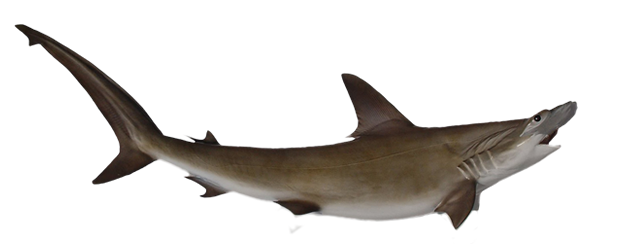Shark, H.H. – Scalloped

View Regulations

Scientific Name
Sphyrna lewini


Common Names
bronze hammerhead, kidney-headed shark, southern hammerhead shark


Description
The Scalloped Hammerhead Shark is a shade smaller than the Smooth Hammerhead and is characterized by its hammer shaped head. At the center of the arch of the head is a notch and receding in either direction the head is swept back. The coloration of this shark rages from grey to a darker olive coloration with darker tips on the fins.


Habitat & Behaviour
Scalloped Hammerheads can often be found in large migratory schools when young. As they age they are more likely to be found in smaller numbers or alone. Scalloped Hammerheads hunt in shore and hang around ocean shelves. Older sharks may take up residence in particular areas, hunting and resting permanently in an area.


Natural Prey
The Scalloped Hammerheads diet ranges in accordance to its size. Larger sharks may eat smaller sharks and larger fish. Smaller sized sharks may make a meal of sardines, mackerel and sometimes cephalopods or other invertebrates.


Handling Tips
It goes without saying that you should steer well clear of any sharks mouth. They also have rough skin which if whipped on you can leave a rash. Little ones wiggle a quite a bit, grab behind gills and hold tail. Larger sharks tail snare if you can and keep in water. When releasing sharks try to leave as little line as possible. Hooks rot out in a few weeks. Pro Angler supports shark conservation and recommends you catch and release. If brought into the boat, leave for 15-20 minutes before handling, shark will tire and be easier to handle as their body is very strong as well. Known to even play dead before snapping at you, so be careful!

- Lucky Tackle Box
- Billfish Bounty in the Heart of the Mayan World – Guatemala
- The Best Species of Shark to Catch
- How to Catch a Shark: what equipment do you need?
- The Best Winter Fishing Spots in Texas





